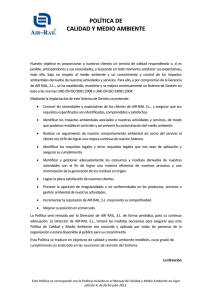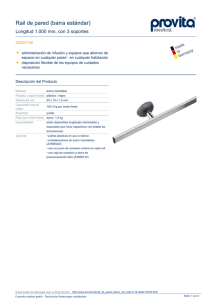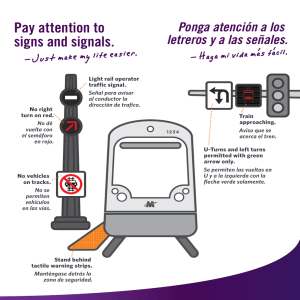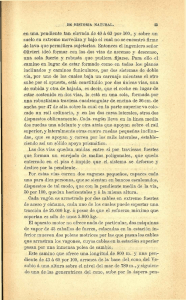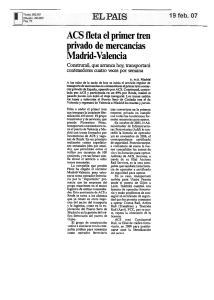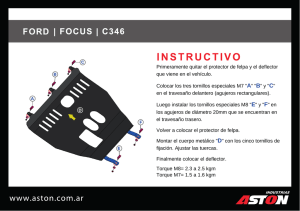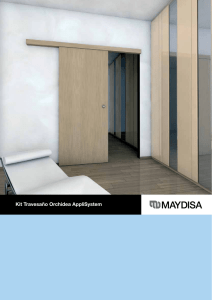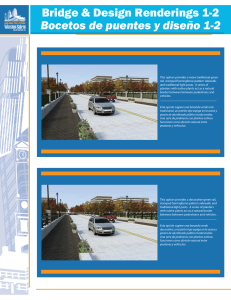Rail Installation Instructions
Anuncio
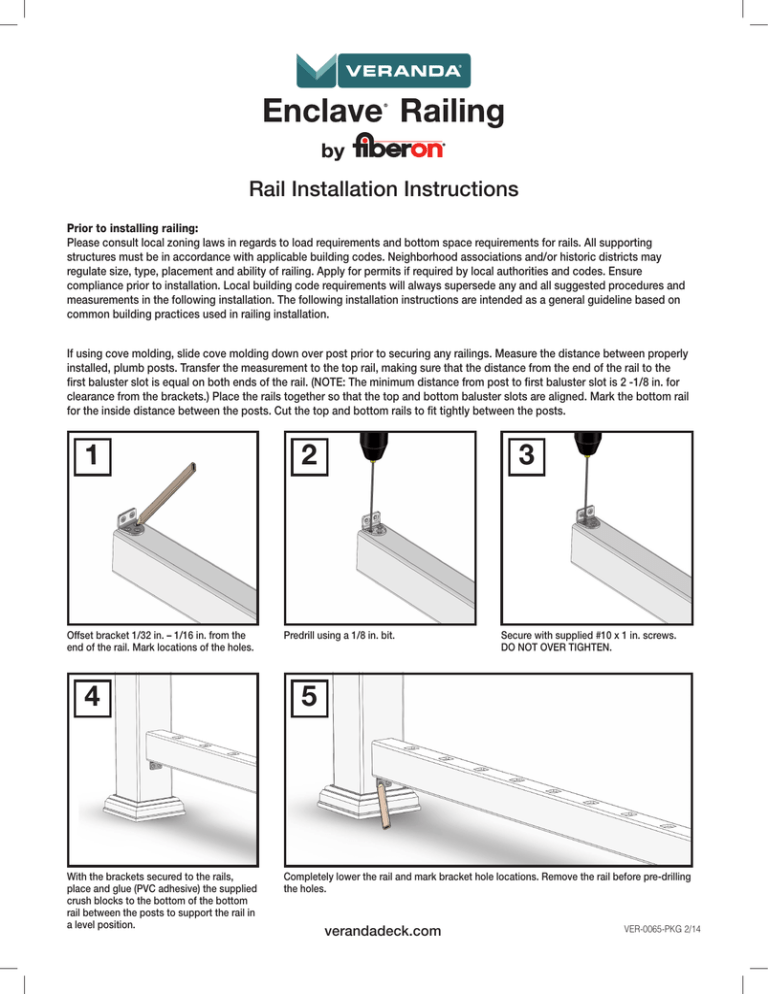
Rail Installation Instructions Prior to installing railing: Please consult local zoning laws in regards to load requirements and bottom space requirements for rails. All supporting structures must be in accordance with applicable building codes. Neighborhood associations and/or historic districts may regulate size, type, placement and ability of railing. Apply for permits if required by local authorities and codes. Ensure compliance prior to installation. Local building code requirements will always supersede any and all suggested procedures and measurements in the following installation. The following installation instructions are intended as a general guideline based on common building practices used in railing installation. If using cove molding, slide cove molding down over post prior to securing any railings. Measure the distance between properly installed, plumb posts. Transfer the measurement to the top rail, making sure that the distance from the end of the rail to the first baluster slot is equal on both ends of the rail. (NOTE: The minimum distance from post to first baluster slot is 2 -1/8 in. for clearance from the brackets.) Place the rails together so that the top and bottom baluster slots are aligned. Mark the bottom rail for the inside distance between the posts. Cut the top and bottom rails to fit tightly between the posts. 1 Offset bracket 1/32 in. – 1/16 in. from the end of the rail. Mark locations of the holes. 4 With the brackets secured to the rails, place and glue (PVC adhesive) the supplied crush blocks to the bottom of the bottom rail between the posts to support the rail in a level position. 2 3 Predrill using a 1/8 in. bit. Secure with supplied #10 x 1 in. screws. DO NOT OVER TIGHTEN. 5 Completely lower the rail and mark bracket hole locations. Remove the rail before pre-drilling the holes. verandadeck.com VER-0065-PKG 2/14 6 Pre-drill the holes with a 1/8 in. bit, angling slightly upward and inward to allow for clearance from the rail once repositioned for securing. NOTE: using extended drill bits is recommended to prevent damage to the rail, and allow a more perpendicular driving angle. 9 Carefully position the top rail between the posts and lower onto the two balusters, making sure to fully seat the balusters into the top rail. 12 Insert all balusters into the bottom rail. Reposition the top rail over the balusters, and lower into place between the posts. After the top rail is fully inserted, secure using the supplied #10 x 2 in. screws. NOTE: using extended drill bits is recommended to prevent damage to the rail, and allow a more perpendicular driving angle. DO NOT OVERTIGHTEN. 7 8 Secure the top bracket allowing 1/32 in. – 1/16 in. from the end of the rail. Mark locations of the holes and predrill using a 1/8 in. bit. Secure with supplied #10 x 1 in. screws. DO NOT OVER TIGHTEN. 10 Mark the location of the bracket holes. 13 Complete the installation by gluing the post cap in place using a quality exterior adhesive. verandadeck.com Insert a baluster into the first and last baluster holes. 11 After marking hole locations, remove top rail and balusters. Pre-drill the holes with a 1/8 in. bit, angling slightly upward and inward to allow for clearance from the rail once repositioned for securing. DO NOT OVERTIGHTEN. Bracket shown for visual reference only. 14 Barandilla Enclave ® de Instrucciones para la instalación de las barandillas Antes de instalar la barandilla: Sírvase consultar las leyes de zonificación locales con respecto a los requerimientos de carga y de espacio inferior para las barandillas. Todas las estructuras de soporte deben cumplir con los códigos de construcción vigentes. Asociaciones del vecindario y/o distritos históricos pueden regular el tamaño, el tipo, la colocación y la capacidad para instalar la barandilla. Solicite permisos si así lo requieren las autoridades y códigos locales. Asegúrese de cumplir con la normativa antes de la instalación. Los requerimientos del código de construcción local siempre prevalecen sobre todos y cada uno de los procedimientos y medidas que sugerimos a continuación. Las siguientes instrucciones para instalación están diseñadas como una guía general basada en prácticas de construcción comunes empleadas en la instalación de barandillas. Si utiliza moldura de base, deslícela hacia abajo sobre el poste antes de fijar la barandilla. Mida la distancia entre postes que estén correctamente instalados y a plomo. Transfiera la medida al travesaño superior, asegurándose de que la distancia desde el extremo del travesaño hasta la primera ranura del balaústre sea igual en ambos extremos del travesaño. (NOTA: La distancia mínima desde el poste hasta la primera ranura del balaústre es de 5.4 cm, para dejar un espacio con respecto a los soportes). Coloque los travesaños juntos para que las ranuras superior e inferior del balaústre queden alineadas. En el travesaño inferior, marque la distancia interior entre los postes. Corte el travesaño superior y el inferior para que calcen estrechamente entre los postes. 1 Inserte el soporte a una distancia de 0.8 mm a 1.6 mm desde el extremo del travesaño. Marque la ubicación de los hoyos. 4 Con los soportes fijados a los travesaños, pegue (con adhesivo para PVC) los bloques de soporte suministrados a la parte inferior del travesaño inferior que está entre los postes, con el fin de sujetar el travesaño en posición nivelada. 2 3 Perfore previamente los hoyos con una broca de 3.2 mm. Fije con los tornillos N°. 10 de 2.5 cm suministrados. NO APRIETE EN EXCESO. 5 Baje completamente el travesaño y marque las ubicaciones de los hoyos donde van los soportes. Retire el travesaño antes de realizar la perforación previa de los hoyos. verandadeck.com 6 Perfore previamente los hoyos con una broca de 3.2 mm, inclinando ligeramente hacia arriba y hacia adentro para dejar un espacio con respecto al travesaño una vez que este se haya reposicionado para fijarlo. NOTA: se recomienda utilizar brocas extendidas para evitar dañar el travesaño y permitir un ángulo de arrastre más perpendicular. 9 Coloque con cuidado el travesaño superior entre los postes y bájelo sobre los dos balaústres. 12 Inserte los balaústres restantes en el travesaño inferior. Vuelva a colocar el travesaño superior sobre los balaustres y bájelo hasta su posición entre los postes. Tras haber insertado completamente el travesaño superior, fíjelo con los tornillos N°. 10 de 5 cm suministrados. NOTA: se recomienda utilizar brocas extendidas para evitar dañar el travesaño y permitir un ángulo de arrastre más perpendicular. NO APRIETE EN EXCESO. 7 8 Fije el soporte superior dejando una distancia de 0.8 mm a 1.6 mm desde el extremo del travesaño. Marque la ubicación de los hoyos y realice las perforaciones previas con una broca de 3.2 mm. Fije con los tornillos N°. 10 de 2.5 cm suministrados. NO APRIETE EN EXCESO. 10 Marque la posición de los hoyos donde van los soportes. 13 Termine la instalación pegando las tapas de los postes en el lugar adecuado, utilizando un adhesivo de calidad para exteriores. verandadeck.com Introduzca un balaústre en el primero y en el último hoyo del balaustre. 11 Perfore previamente los hoyos con una broca de 3.2 mm, inclinando ligeramente hacia arriba y hacia adentro para dejar un espacio con respecto al travesaño una vez que este se haya reposicionado para fijarlo. NO APRIETE EN EXCESO. 14
